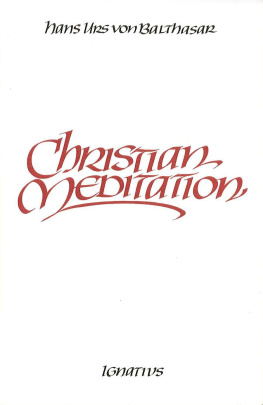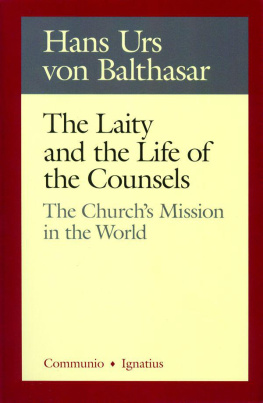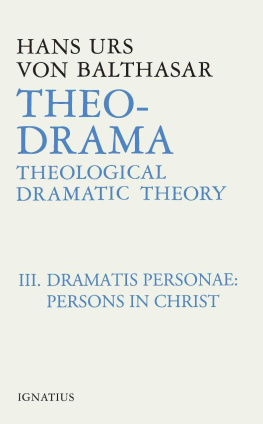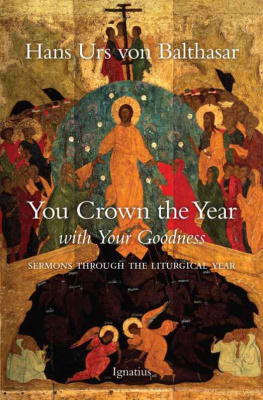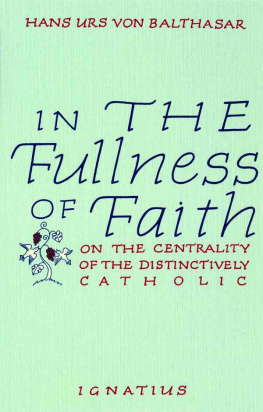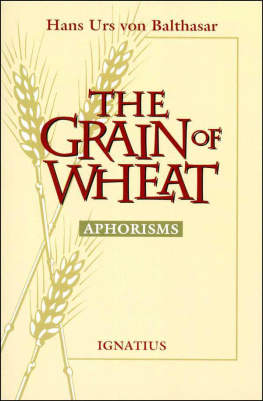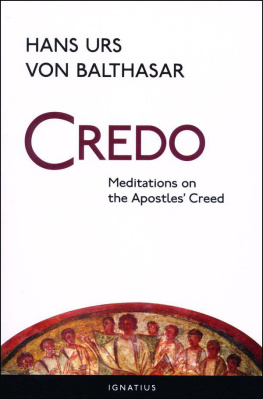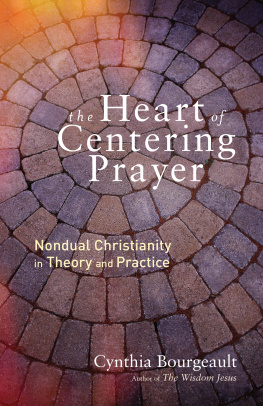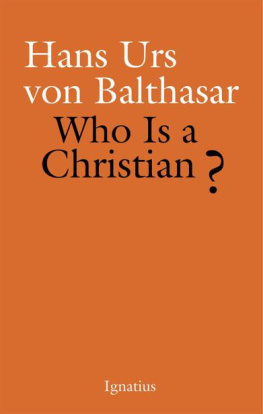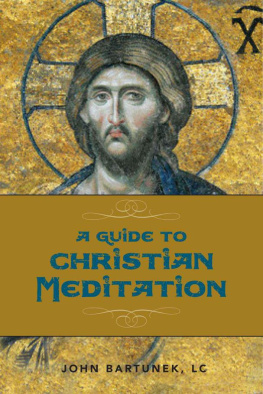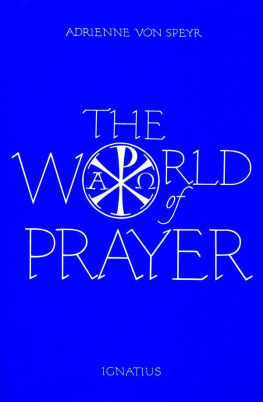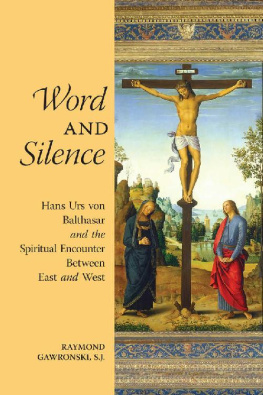HANS URS VON BALTHASAR
Christian Meditation
HANS URS VON BALTHASAR
Christian Meditation
TRANSLATED BY
Sister Mary Theresilde Skerry
Holy Spirit Adoration Sister
IGNATIUS PRESS SAN FRANCISCO
Title of the German original:
Christlich meditieren
1984 Verkg Herder
Freiburg im Breisgau
Cover by Victoria Hoke Lane
With ecclesiastical approval
1989 Ignatius Press, San Francisco
All rights reserved
ISBN 978-0-89870-235-4
Library of Congress catalogue number 88-83746
Printed in the United States of America
CONTENTS
1. The Mediating Word
2. Introduction to Meditation
3. The Light of the Holy Spirit
1. Presence
2. The Silent Word
3. Dwelling on the Word
1. The Marian Way
2. The Ecclesial Way
3. On the Paths of the World
INTRODUCTION
The decisive question is whether God has spoken to the human raceabout himself, of course, and likewise about his reason for creating man and the worldor whether the Absolute remains the Silence beyond all the words of the world.
If the latter is the case, then all the ways are open, and must be pursued, upon which man sets out in search, knowing well that this passing and therefore delusive world cannot be the truth. These ways lead to steep paths that leave everything fleeting and multiple behind in the quest for the Unutterable in heroic asceticism and mystical absorption, which allow a man to break through the prison walls of his own narrow selfperhaps momentarily, perhaps definitively. All the forms of meditation used by the one who gropingly seeks the Most High, hoping to be able to touch him (Acts 17:27), are similar, and all the more so, the more radical the search transcends everything temporal. These forms extend from those of the Far East to the final forms of Mediterranean antiquity in Plotinus, whose directions for attaining ecstasy even the young Augustine tried (in vain).
If, however, the first possibility is valid, namely, that God has spoken, we thereby enter into the biblical sphere, that of the three monotheistic religions, for Islam too is very strongly permeated by Old and New Testament themes. In that case, meditation can only meaningfully be reflection on and assimilation of Gods Word about himself and the world. The sole remaining question is where this Word of God reaches its full stature, in which all the things that are individually valid converge in exuberant unity. Can this be the case with the Koran, which was said to have been transmitted to the prophet by the Angel Gabriel, the strophes memorized by the devout Moslem and daily repeated in an attitude of adoration? Can an angel speak of God in such a way as to reveal his inner depths? No one but Gods Spirit has recognized what is in the depths of God (1 Cor 2:11).
A similar though not identical question has to be addressed to the Old Testament, whose law was also transmitted by angels (Gal 3:19; Acts 7:38), whose directives passed through the mouths of prophets (Thus says the Lord), in various prescriptions, precepts, promises, ordinances, commands (Ps 119) reflected on, mumbled and meditated on. Nevertheless, there remained deep unsolved and unsolvable problems on the level of the Old Covenant (Job, Qoheleth!). To solve them, that fullness of Covenant between God and man was needed. This Covenant simultaneously accomplishes two things: God speaks through himself and he speaks as a man who clarifies the questions of human existence: the meaning of suffering, transitoriness and death, as well as the fact that the whole of mortal life finds its finality in God, that is, in the resurrection of the dead human being into eternal life. The beginning of the Letter to the Hebrews summarizes all this with concise power:
Often and in varied ways God spoke of old to our ancestors through the prophets. In these final days he has spoken to us [all] through his Son, whom he appointed as heir of the universe. He, the reflection of his glory, the imprint of his being... effected purification from sins [by his Cross] and [rising] took his place at the right hand of Majesty on high. He has become so much more exalted than the angels as the name he inherited surpasses them (Heb 1:1-4).
The dimensions of Christian meditation develop from Gods having completed his self-revelation in two directions: God speaks out of his own depths and, speaking as a man, he discloses at the same time the depths of man. Christian meditation can begin only where God reveals himself as a man and, consequently, where this man reveals God to his very depths. Hence this point of departure may not be bypassed. And this meditation can take place only where the revealing man, Gods Son, Jesus Christ, reveals God as his Father: in the Holy Spirit of God, whom he truly communicates to us so that in this Spirit given to us we may join in probing Gods depths, which only Gods Spirit probes (1 Cor 2:10)But we have received the Spirit who is from God so that we may realize what God has given us (1 Cor 2:12).
Consequently, Christian meditation is entirely trinitarian and at the same time entirely human. In order to find God, no one need reject being human personally or socially, but in order to find God all must see the world and themselves in the Holy Spirit as they are in Gods sight.
I
THE SON AS WORD OF THE FATHER
1. The Mediating Word
No one knows the Father but only the Son and anyone to whom the Son wants to reveal him (Mt 11:27). No one has ever seen God; an only begotten Son of God, who is on the Fathers bosom, has explained him to us ( autos exgesato ), has given us an exegesis (Jn 1:18). No one has seen the Father except him who comes from the Father: he has seen the Father. Truly, truly I tell you... I am the bread of life (Jn 6:46f.).
It is not we who force a knowledge of the Absolute for ourselves by means of techniques under our control. Of his own accord God freely reveals himself, explains himself in his Son and gives us a Word that satisfies our hungering soul. We learn that man has been created in Gods image and likeness (Gen 1:27) so that God can one day place in his creature the perfect image (2 Cor 4:4; Col 1:15) and complete likeness (Heb 1:3) of the Invisible One. The man Jesus Christ is not subsequently raised to being this image of God; from the very beginning he was aware of being such. His but I tell you surpasses Moses authority and can only be the I of Yahweh himself and of his Word. Before Abraham was, I am (Jn 8:58). This is the intolerable scandal of a people accustomed to prophets. They try to kill Jesus because he called God his Father and thus made himself equal to God (Jn 5:18). They want to stone him for blasphemy, because you who are human make yourself God (Jn 10:33).
In the whole history of religion Jesus claim is without parallel. He demands to be loved absolutely, in preference to any mutual human love, no matter how sacred, and even in preference to any well-ordered love of self (Lk 14:26). He imputes theft and robbery to anyone who does not go to God through him, the only gateway (Jn 10:8). Anyone who does not hear and understand Gods Word speaking in him and does not love him as this Word can claim no personal relationship to God: If God were your father, you would love me.... Why do you not understand what I say? Because you cannot listen to me as the Word (Jn 8:42f.). Anyone who does not love me does not keep my words; but the Word that you hear is not my Word but the Fathers who sent me (Jn 14:24). The Father loves you because you have loved me (Jn 16:27). According to Jesus demand, then, the condition for mutual love, true Covenant love, between God and man is love for him, the God-Man and perfect embodiment of the Covenant. He is the twofold channelof God to us and of us to God.
Hence, basically, Christian meditation can be nothing but loving, reflective, obedient contemplation of him who is Gods self-expression. He is the very explanation of God and his teaching to us. Anyone who goes beyond this does not possess God, but anyone who remains within this teaching possesses the Father as well as the Son (2 Jn 9). This remaining means believing, and this faith is granted eyes to look through the man Jesus and see the divine: Anyone who [really] sees me sees the Father (Jn 14:9). In Christian meditation we are enabled to perceive the state and attitude of God not only in Jesus words but also in all his states and acts. When Jesus is angry (as Mark frequently mentions), when he brandishes the whip, we perceive how and why Yahweh, the jealous God, is angry. When he weeps over Jerusalem, which was not willing, he reveals the sorrows of the Lord of the Covenant on account of his love that was squandered in vain. When he lets himself be asked for somethingby his Mother in Cana, by the Roman centurion in Capernaum and by the Gentile woman in Syriaand thereby persuaded, he shows how persevering prayer ultimately wrenches the desired favor from Gods heart (Lk 18:1-7). When he does not hesitate to leave the two beloved women in Bethany without an answer and apparently in the lurch, he demonstrates in advance that on the Gross he will feel forsaken by his Father, although he knew beforehand that the hour is already here in which you will leave me alone.... But I am not alone, for the Father is with me (Jn 16:32; cf. 8:29). When from the viewpoint of this world it would seem that God abandons us, even and precisely then he does not.
Next page
